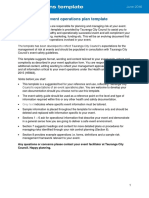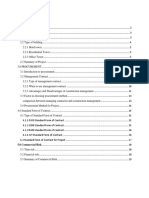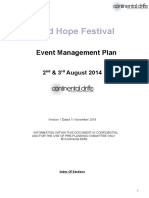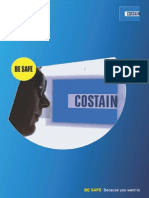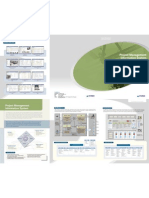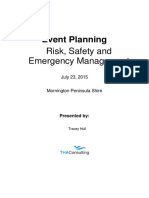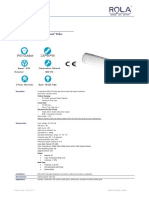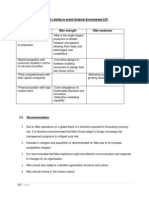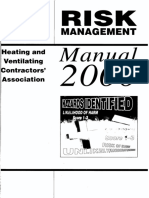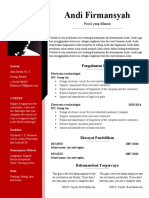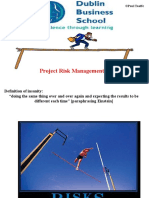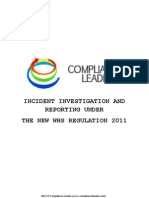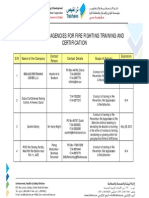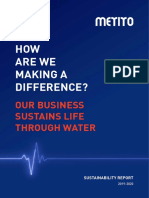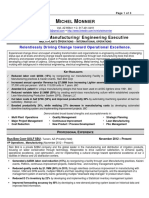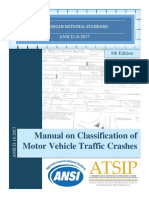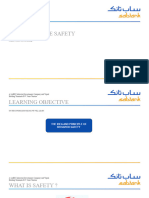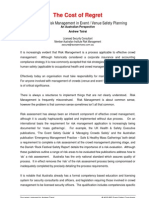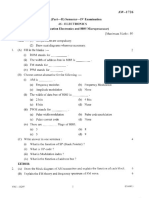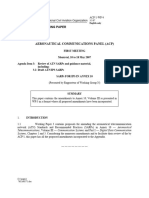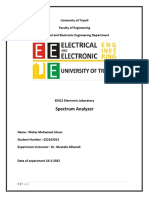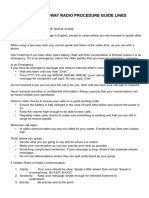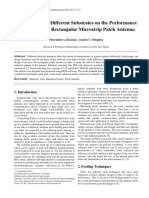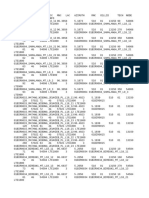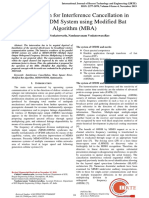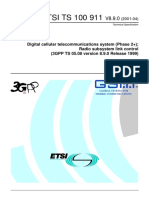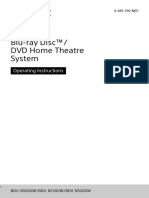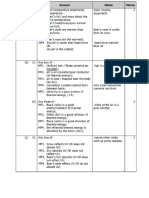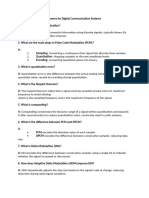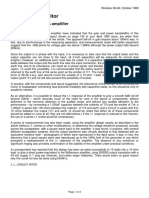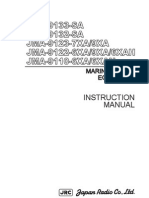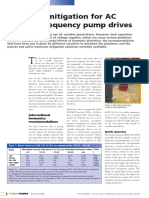Astroworld 2021 Event Operations Plan
Astroworld 2021 Event Operations Plan
Uploaded by
Mehdi ElamraniCopyright:
Available Formats
Astroworld 2021 Event Operations Plan
Astroworld 2021 Event Operations Plan
Uploaded by
Mehdi ElamraniOriginal Title
Copyright
Available Formats
Share this document
Did you find this document useful?
Is this content inappropriate?
Copyright:
Available Formats
Astroworld 2021 Event Operations Plan
Astroworld 2021 Event Operations Plan
Uploaded by
Mehdi ElamraniCopyright:
Available Formats
2021 Event Operations Plan (EOP)
Venue: Prepared by:
NRG Park Seyth Boardman
One NRG Park Seyth.boardman@insomniac.com
Houston, TX 77054 (614) 419-7959
Dates: Version: 0.1
November 5th & 6th, 2021
PART 1: GENERAL INFORMATION 5
Introduction 5
Festival Background 5
Festival Site Description 5
Jurisdiction Statement 6
Festival Operation 6
COVID Compliance 6
Festival Management Structure 7
Festival Departments 7
Incident Command System 8
Event Control Center 8
Incident Command Post 8
Communications 8
Community Relations 9
PART 2: SECURITY PLAN 10
Security Personnel 10
SECURITY VENDORS 10
Event Day Briefing 11
Roles & Responsibilities 11
Physical Security 12
HARD PERIMETER 12
INTERIOR 12
STAGE FRONT 12
Access Control 12
GENERAL 12
EMPLOYEES 12
Credentials 13
Contraband Check 13
METAL DETECTION SCREENING (WTMD) 13
Astroworld 2021 EOP - Page 1
BAG CHECK 13
BAG SEARCH PROCEDURE 13
PAT DOWN SEARCH 14
PAT DOWN SEARCH PROCEDURE 14
CANINE TEAMS 14
VEHICLE SEARCH 15
Firearms 15
Alcohol Compliance 15
ALCOHOL COMPLIANCE TEAMS 16
Incident Management 16
WHAT IS AN INCIDENT? 17
ANATOMY OF AN INCIDENT 17
INCIDENT MANAGEMENT RESOURCES 17
INCIDENT SEVERITY CLASSES 18
Incident Reporting 19
WHAT IS AN INCIDENT REPORT? 19
WHY DO WE DO THEM? 19
ROLES AND RESPONSIBILITIES 19
ELEMENTS OF AN EFFECTIVE INCIDENT REPORTING 20
REQUIRED INFORMATION 20
INCIDENT REPORTING NOTES 21
Radio Communications 21
GENERAL 21
EQUIPMENT 21
PROPER USAGE 22
Incident Actions 22
LOST PERSONS 22
MISSING CHILD 23
ASSAULTS (ALL TYPES) 23
TRAUMATIC INJURY 24
TRAUMATIC INJURY RESULTING IN DEATH 24
THEFT/ROBBERY/MINOR CRIME 25
AGGRESSIVE/THREATENING PERSONS 25
PERSON(S) WITH WEAPON(S) 26
ACTIVE SHOOTER 27
How to Respond When An Active Shooter is in Your Vicinity 27
Astroworld 2021 EOP - Page 2
How to Respond When Law Enforcement Arrives 28
CIVIL DISTURBANCE/RIOT 29
Identifying Dangerous Crowd Behavior 29
Crowds Exhibiting Threatening or Destructive Behavior 29
BOMB/TERRORIST THREAT 30
UNATTENDED PACKAGE (NO KNOWN THREAT) 31
SUSPICIOUS PACKAGE 32
PART 3: EMERGENCY RESPONSE PLAN 33
Scope/Elements of the Plan 33
Initial Action 33
Immediate Call Lists 34
Incident Specific Flow Charts 34
INCIDENTS INVOLVING INJURIES 34
Multiple Casualty Incidents (MCI) 34
SEVERE WEATHER INCIDENTS 35
Weather Monitoring 35
Public Address 35
High Heat 36
High Wind 36
High Wind Incident Actions 37
Earthquake 37
Lightning 38
Tornado 38
FIRE 38
Organizational Actions 40
POWER LOSS 40
HAZARDOUS MATERIALS RELEASED 41
Spills and Releases - Specific Response Information 42
EMERGENCY INCIDENT MANAGEMENT 43
POST-INCIDENT MANAGEMENT 43
COMMUNITY RELATIONS 44
PRESS PROCEDURES 44
PART 4: EVACUATION PLAN 45
PRE-EVENT BRIEFING 45
DETERMINATION TO EVACUATE 45
EMERGENCY RESPONSE TEAM (ERT) 45
Astroworld 2021 EOP - Page 3
EVACUATION PHASES 45
EMERGENCY RESPONSE TEAM PREPARATION PHASE 45
STAFF PREPARATION PHASE 45
SHOW POWER SHUNT 46
PUBLIC ADDRESS ANNOUNCEMENTS 47
EVACUATION RESPONSIBILITIES 48
POINTS OF EGRESS 49
EVACUATING PERSONS WITH DISABILITIES 49
AREA OF REFUGE 50
STAFF ACCOUNTABILITY 50
PART 5: SUPPLEMENTAL MATERIAL 51
PROHIBITED ITEMS LIST 51
BOMB THREAT CHECKLIST 52
INCIDENT REPORT FORM 53
ASTROWORLD 2021 GLOBAL MAP 54
ASTROWORLD 2021 EVAC MAP 55
Astroworld 2021 EOP - Page 4
PART 1: GENERAL INFORMATION
Introduction
Emergent situations may arise at any time during live events. The festival’s ability to appropriately
respond to any incident relies on the careful evaluation of potential risks and the development of an
action plan that addresses those risks.
Astroworld management believes that when an emergency situation occurs on the event premises, it
must, to the extent of reasonable possibility, take the necessary actions to safeguard its guests and
employees and to minimize damage to event property and its effect on event operations. Management
understands that such action should be preplanned in writing prior to such an emergency and should
be consistent across all operations. This Event Operations Plan, hereinafter referred to as the EOP, is
part of management’s effort to meet this objective.
Astroworld, as an organization, will be prepared to evaluate and respond appropriately to emergency
situations, so as to prevent or minimize injury or illness to guests, event personnel and the general
public, and to minimize resulting damage. This will be accomplished through the planned actions of
event personnel and with the participation of outside agencies as the severity of the incident may
indicate.
Festival Background
The Astroworld Festival was started in 2018 by rapper Travis Scott, the same year he released an album
of the same name. The festival is Scott’s tribute to his hometown of Houston, Texas, and, more
specifically, the now defunct Astroworld theme park, the grounds of which the festival takes place.
Initially, the festival was a single day and featured only hip-hop and rap artists. The 2021 edition of the
festival has expanded to two days and includes amusement rides, an arcade, several stages, and artists
from multiple genres. Astroworld is now one of the biggest artist-curated festivals in the world.
Festival Site Description
NRG Park is a sports and entertainment complex located in Houston, Texas. It is located on Kirby Drive at
the South Loop West Freeway. This complex of buildings encompasses 350 acres of land and consists of
four venues: NRG Stadium, NRG Center, NRG Arena and the NRG Astrodome. The complex hosts many
large events throughout the year and is the home of the Houston Texans NFL team and the Houston
Livestock Show and Rodeo. The Astroworld festival site will be situated in the parking lots on the east
side of the complex between Murworth Drive & McNee Road and South Main Street & Lantern Point
Drive. These parking lots used to serve the now defunct Astroworld theme park that used to be across
the street from the complex. The festival will feature 2 state of the art stages, several sponsored
activations, an arcade/midway, amusement park rides, and plenty of food and merchandise vendors.
A general map of the festival grounds can be found below:
Astroworld 2021 EOP - Page 5
Jurisdiction Statement
The festival site falls under the jurisdiction of the City of Houston Police and Fire Departments.
Festival Operation
Astroworld is a two-day, multi-stage music and arts festival that incorporates many theme- and
art-related elements to enhance the fan experience. The festival will offer guests many fan amenities
throughout the venue.
Tickets for this festival are sold out.
The Festival is scheduled to open at 12:00 but all preparations are being made to be able to open as
early as 9am.
COVID Compliance
Astroworld Festival understands the impact that the recent COVID pandemic has had on the world,
especially in the live event industry. Even though restrictions are in the process of being lifted,
Astroworld will continue to take precautions to ensure the safety and security of its guests, employees
Astroworld 2021 EOP - Page 6
and staff. The festival is in regular communication with local health and public safety officials and
intends to abide by relevant state recommendations to ensure a safe and enjoyable festival experience.
Festival Management Structure
Name Title Email Address Phone Number
Emily Ockenden emily@bwglive.com 310.382.7902
Sascha Stone sascha@scoremoreshows.com 310.696.1364
Lucas Conder lucas@scoremoreshows.com 406.531.7123
Brent Silberstein silberhou@gmail.com 713.539.4593
Brad Wavra bradwavra@livenation.com 818.439.7881
Joe Stallone Joseph@scoremoreshows.com 512.228.7547
Seyth Boardman Safety & Risk Director seyth@b3risksolutions.com 614.419.7959
Festival Departments
Administration - Festival administration is responsible for the overall operation of the event. The
administration includes the executive producer and festival director.
Site Operations - Site operation is responsible for the overall site infrastructure and build. Site ops
oversees all fencing, tents, electrical, grounds, plumbing and water, motor pool and heavy equipment
operation. Site operations administers the facilities.
Safety & Security - Safety and security is responsible for all facets of employee and guest safety and
security. This includes hazard mitigation and emergency management and response. Security directly
supervises the hundreds of security staff during the festival and maintains an important role in guest
relations.
Production - Production is responsible for all aspects of programming and stages including lights and
sound. Production is the interface with the Artist’s tour manager and road crew and is ultimately
responsible for ensuring stage safety during any type of incident.
Media/Public Relations - Media Relations is the main interface for any and all media requests on
property. MR will work closely with the festival's designated spokesperson should an incident occur.
Artist Relations - Artist Relations is the interface for the artists and their entourage. AR coordinates
schedules, hospitality and transportation for the festival’s artists.
Sponsorship - Sponsorship coordinates any and all festival sponsors, ensuring contractual obligations are
met and sponsor needs are attended to. SR is the main point of contact for all vendors.
Astroworld 2021 EOP - Page 7
Food & Beverage - Food & Beverage is responsible for all F & B concessions throughout the venue and
festival site.
Incident Command System
The management of event day incidents will be facilitated using an Incident Command System (ICS) as
outlined by the National Incident Management System (NIMS). The ICS is designed to coordinate an
emergency response from internal departments, as well as responses from agencies at the local, state
and federal level. The festival’s ICS will utilize a unified command model and will be activated for any
incident of significance.
Event Control Center
For all event operations, the festival will maintain an Event Control Center (ECC) located TBD
The ECC phone number is: TBD
All operations surrounding safety and security will flow through the ECC and a log of all requests for
service will be maintained.
All response operations to minor incidents will be directed out of the ECC. Should a minor incident
occur during the festival operating hours, the festival emergency manager will direct the response
through the ECC. If, at any time, an incident progresses to the point that the festival emergency
manager requests activation of the ICP, the local jurisdiction will immediately assume command and
direct the response from the ICP located in the ECC.
Incident Command Post
The location of the Festival Incident Command Post (ICP) will be in the ECC.
Representatives from the festival and the local jurisdiction will be represented in the ICP.
Should an incident occur, the festival ICP will be activated and will direct response and recovery
operations. The ICP phone number is: TBD
The festival ICP is under the authority of the festival emergency manager. In the event of a significant
incident, the festival emergency manager will request activation of the local jurisdiction ICP.
On activation of the local jurisdiction ICP, the designated festival emergency manager will respond to
the ICP and direct festival response operations as part of the unified command. All festival departments
and operations will follow instructions as directed by the unified command.
Communications
Event operations will be facilitated utilizing digital 2-way radio communications with group messaging
capability. All calls for service will be directed to the Event Control Center (ECC) and resources will be
dispatched from there.
Astroworld 2021 EOP - Page 8
Radio technicians will be on site during event operating hours should there be a failure of the radio
system. These technicians will maintain adequate redundancy of all radio equipment.
Should there be a catastrophic failure of the radio system, the festival will rely on cell phone
communication for operations and response. This will be used as an option of last resort as it is
expected that cell phone networks will be slow and unreliable with the expected additional traffic
during the event.
Should an incident occur where the use of radio transmission is contraindicated (i.e. suspicious
package), information runners will be used to relay information back to the ECC and/or the ICP.
Community Relations
Astroworld strives to be a good neighbor in the communities directly adjacent and leading to the
festival site. The festival has established the following email address available to community members
for comment during the festival operating hours.
E-MAIL: TBD
Astroworld 2021 EOP - Page 9
PART 2: SECURITY PLAN
Astroworld and its risk, safety and security managers realize the importance of having a thorough and
detailed security plan in place for all live events despite the predicted attendance or perceived threat
level. Based on the site’s layout and numerous past experiences, a Security Plan has been established
to help mitigate potential negative issues within the scope of the festival. From this plan, the potential
for multiple alcohol/drug related incidents, possible evacuation needs, and the ever-present threat of a
mass casualty situation are identified as key concerns. That plan is outlined in detail below.
Security Personnel
Recognizing the importance of security management and oversight, a security management structure
has been created to ensure clear and direct communication between festival management and security
vendors. The following is a list of Astroworld security managers responsible for the hiring and
implementation of security personnel for the Astroworld Festival:
Area of Responsibility Manager Name Phone Number E-mail
Risk Management Seyth Boardman 614.419.7959 seyth@b3risksolutions.com
Security Director Shawna Boardman 614.915.2263 shawna@b3risksolutions.com
Interior Security Director Marty Wallgren 651.324.1435 marty@b3risksolutions.com
Exterior Security Director Dillon Lawson 714.420.5931 dillon.lawson1523@gmail.com
Security personnel will be deployed throughout the interior and exterior of the venue as well as all
vehicle check-in points in various areas and roles. These areas will consist of, but are not limited to, the
following:
● All roadways and venue access points
● Emergency egress gates and pathways
● All exterior fence lines and roadways
● Production areas as well as front and rear of all stages
● All VIP areas, interior and exterior activations
● Roamers throughout both interior and exterior of venue
SECURITY VENDORS
The below security companies are responsible for the security staffing of the Astroworld festival
footprint:
Astroworld 2021 EOP - Page 10
Vendor Name Manager’s Name Phone Number
Contemporary Services Corporation (CSC) Chris Laney 909.414.5418
Event Day Briefing
As a continuing effort to be prepared for any incident which may occur during Astroworld, the Event
Security Director or his/her assignee will prepare an Event Day Briefing (EDB) to be communicated to
each department head and the Emergency Response Team (ERT) at the start of each event day. The
EDB will:
● Provide day specific information about the event
● Provide day specific information about the ETL
● Indicate Staff Supervisor emergency assignments
● Identify the Security AOD
● Provide event-specific contact information and special considerations
Roles & Responsibilities
EXECUTIVE PRODUCER -
● Oversees festival administration
● Authority to stop show
FESTIVAL DIRECTOR -
● Manages all festival operations
● Authority to stop show
DIRECTOR OF RISK & SAFETY - SEYTH BOARDMAN
● Directs all security operations
● Develops and implements security policy
● Responsible for all aspects of festival Safety and Security
DIRECTOR OF SECURITY - SHAWNA BOARDMAN
● Directs artist movements and artist safety
● Manages stage safety and security
● Acts as a proxy for the Director of Risk
● Coordinates event security companies
● Facilitates field emergency operations as directed by Incident Command
● Leads Emergency Response Team (ERT)
● Oversees ADA Evacuation
● Makes decisions regarding event policy enforcement
Astroworld 2021 EOP - Page 11
● When on Property is the Security AOD
● Comprises Emergency Response Team
● Acts as the festival Emergency Manager
Physical Security
HARD PERIMETER
A hard perimeter will be established surrounding the complete venue separating the controlled,
ticketed areas from the rest of the event property. A variety of devices will be used to accomplish this
as follows:
● 8’ tall Harris fencing with scrim
● Bike rack-type crowd control barricade
● Snow fencing
● Concrete Bollards
INTERIOR
Inside the venue, there will be many areas that will not be available to the general public. Hard
perimeters of these areas will be established using the following:
● 8’ tall Harris fencing with scrim
● Bike rack-type crowd control barricade
STAGE FRONT
The front of the stages will be protected with a MOJO-style barricade utilizing an apron to provide
stabilization and prevent movement.
Access Control
GENERAL
This is a ticketed event with paid admission. All guests will be required to redeem a ticket for an
admission wristband. At the entry points, wristband scanners will be in place to determine whether or
not a guest is permitted to enter the venue. Guests without wristbands will be denied entry into the
venue and/or directed to the Box Office to mitigate the issue.
The general public will access the venue via the Main Entrance, located southeast of the intersection of
Murworth and Lantern Point. Paths leading to the Main Entrance will be clearly marked, brightly lit and
easily accessible for all guests of the festival.
EMPLOYEES
Employees will be directed to enter the venue via TBD. All employees and any bags will be checked for
contraband.
Astroworld 2021 EOP - Page 12
Credentials
All employees, artists, vendors and staff will be required to be credentialed while in the venue.
Credentials will determine the level of access throughout the venue.
Credential boards will be created and posted at all entrances, both into the venue, as well as restricted
areas inside the venue. Due to the nature and sensitivity of the credential pass lists, they will be
created and distributed on or near actual show days.
Contraband Check
To provide a safe and enjoyable event atmosphere, Walk Through Metal Detectors (WTMDs), visual
scans and comprehensive bag checks will be conducted at all event entry points. In some situations,
pat down searches may be implemented.
No prohibited items will be allowed. In the event a patron presents at the gate with prohibited items,
they may return them to their car or be given the option of disposing of these items in the provided
trash cans. At no time will security take possession of these prohibited items.
If a patron refuses to return items to their car or surrender prohibited items, an event supervisor will be
contacted to handle the situation.
A comprehensive Prohibited Items list is included in the supplemental materials at the end of this
packet.
METAL DETECTION SCREENING (WTMD)
This festival will be utilizing walkthrough metal detectors at both the Main Entrance and the Staff
Entrance. All staff will be required to pass through the WTMD. If any prohibited items are revealed they
will be required to return them to their car or dispose of them in the provided trash cans. Should any
weapons be revealed at this point, police will be asked to intervene.
BAG CHECK
All bags will be checked. The bag check procedure is designed to ensure contraband and dangerous
items do not enter the facility.
● All search security will be trained in proper bag search procedure.
● The Director of Security will coordinate the bag search.
BAG SEARCH PROCEDURE
● Ask the employee or guest to place the bag on the table and open each compartment.
● Ask the person to remove large items. Never touch items in a person’s bag.
● Using a search stick and flashlight, move small items aside to clearly view the entire
compartment. Never reach inside of a bag.
● If anything suspicious is encountered, request a supervisor.
Astroworld 2021 EOP - Page 13
PAT DOWN SEARCH
In certain situations (power failure, broken WTMDs, etc.), the festival will implement a pat down search
of all persons entering the facility. The pat down search is designed to ensure contraband and
dangerous items do not enter the facility.
● Pat down searches will be approved by the Festival Director & Director of Security and will be
instituted as needed.
● Each pat down lane will be staffed with male and female security.
● Under no circumstances will male security pat down female employees or guests or female
security pat down male security or guests.
● An Event Staff Supervisor will be present at each search gate.
PAT DOWN SEARCH PROCEDURE
Prior to the search lane, signs will be posted indicating a pat down search is being conducted. The sign
will clearly indicate that employees and guests should remove any items from their pocket and hold
them in their hand.
● Ask the guest’s permission to search them. If denied, deny the guest entry.
● Ask if their pockets are empty and if they are carrying anything prohibited.
● With the employee or guest facing you, ask them to extend their arms out to their sides.
● Using the back of the hands, run both hands down the torso. Avoid running the hands over the
breasts.
● Using the back of the hands, run hands across the waist, starting in the center and moving to
the sides.
● Run both hands down each leg.
● Ask the employee or guest to turn around.
● Using the back of the hands, run both hands down the back.
● Using the back of the hands, run hands across the waist, starting in the center and moving to
the sides.
CANINE TEAMS
In an attempt to prevent bombs and weapons from entering the event grounds, Astroworld will employ
teams of canines trained to detect explosive and incendiary devices. Canine teams will be employed to:
● Search all vendor vehicles entering the property
● Search all employee vehicles and bags entering the property
● Search guest bags entering the property
● Randomly pass by guests standing in the queues
Canine teams will be deployed throughout the property and will pass through the crowds. Should a dog
indicate on any employee, guest or object, the festival reserves the right to conduct a search. Should
consent be denied, the festival reserves the right to eject the subject from the event.
Astroworld 2021 EOP - Page 14
VEHICLE SEARCH
All vehicles will be subject to a full vehicle search as they enter the venue via security staff and random
K-9 screening.
Firearms
Employees and guests are prohibited from entering the venue at any time with firearms. Only sworn
law enforcement officers on-duty or required by law will be permitted to carry a firearm on the
property.
Should an employee be discovered with a firearm.
● The employee’s direct supervisor will be notified immediately.
● The Event Director of Security will be notified immediately.
● Law Enforcement will be called to secure the weapon.
● If the employee is in lawful possession, they will be advised to secure the weapon in the
provided gun safe maintained by the festival security department.
● If in unlawful possession, the employee will be terminated and referred to local law
enforcement for final disposition.
Should a firearm be discovered at any vehicle checkpoints:
● The patron will be given the option to return it back to their place of residence.
● If they choose not to, they will be required to sign it over to the Festival security department to
keep in a gun safe for the weekend.
● At the end of the festival when the patron is ready to leave, they will be required to present an
ID and sign for their weapon again.
Should a firearm be discovered at the interior festival checkpoints:
● Staff should immediately get their supervisor involved, who should then call Command Post if
police are not readily available at the gate.
● Police should determine if the person is in lawful possession of the firearm.
● If they are, they will need to follow the procedure stated above.
● If they are not, police should handle them accordingly.
Alcohol Compliance
Alcohol will be for sale during the operating hours of the event. Foreseeing alcohol risks and instituting
measures to protect patrons from those risks is a priority for the festival. Over-consumption of alcohol
by guests can lead to disorderly conduct and in some instances, serious medical conditions.
Alcohol Management Policies
Astroworld 2021 EOP - Page 15
● All persons requesting alcoholic beverages will be required to present a valid government ID as
a verification of age. No one under the age of 21 will be served alcoholic beverages.
● Alcohol from any external source will not be allowed in the venue at any time.
● No alcoholic beverages will be allowed to leave the venue.
● Staff may deny the sale of alcohol to any individual or group at any time.
● The Event Director of Security will reserve the authority to cease all alcohol sales at any time for
any reason.
● All alcoholic beverages will be secured by lock at all times when not for sale.
● All areas serving alcohol will be staffed with security to maintain order and monitor the crowd.
The festival concessions staff will use a wristband system in conjunction with POS ID verification to
make it easy to identify “of age” guests. A separate colored wristband will be used for each day of the
festival. Guests will be ID- and age-verified prior to the sale of alcohol and a wristband will be placed on
each verified guest’s wrist.
Any guest with a wristband that appears to have been removed or tampered with will be denied sale
and the wristband will be removed.
Event Staff will be briefed on the wristband color of the day. Staff will be directed as part of their post
orders to visually check guests with alcohol to ensure they have a wristband of the proper color for the
day. Should they encounter any “pass offs” or guests without wristbands, they are to call Event
Command and request assistance.
ALCOHOL COMPLIANCE TEAMS
In an effort to curb underage consumption, Astroworld will employ Alcohol Compliance Teams (ACT)
throughout the venue. These teams will be responsible for observing the crowd and:
● Verifying the age of any guest in possession of alcohol or an “over 21” wristband.
● Identify guests that are extremely intoxicated and exhibiting any or all of the following:
○ Unsteady gait/inability to walk under own power
○ Confusion
○ Altered Mental Status
○ Vomiting
○ Loss of consciousness
The ACT will refer any guests exhibiting signs of extreme intoxication to medical teams for evaluation.
Incident Management
As with all live events, staff will be exposed to an incident of some kind during Astroworld Festival.
Understanding incident management will ensure that every incident is addressed in an appropriate and
efficient manner, protecting the safety and security of our guests and the integrity of our event.
Astroworld 2021 EOP - Page 16
Many incidents will be minor, and a few will be complex. The Festival considers incident management
an integral part of its success and continually improves its incident management processes with a
significant investment in incident management resources and systems.
WHAT IS AN INCIDENT?
An occurrence or event that interrupts normal procedure or the expected operation.
ANATOMY OF AN INCIDENT
Identification - The first step in effective incident management is identification of an incident. Most of
the time, an employee will either witness an event as it occurs or receive a report of an incident from a
guest or contractor.
Notification - Once an incident is identified, it must be reported to Event Control. Our Event Control
dispatchers are trained to appropriately respond to incidents through asset allocation and event
initiation in our Incident Management System (IMS).
Response - Response to the incident would include asset allocation (security or medical response) and
local response, or things staff can do on scene that will begin to resolve the incident. Many times this
includes communicating with guests, securing the incident area and, most importantly, making
observations and taking notes of the circumstances and conditions surrounding the incident.
Assist - Assist in the resolution of an incident through identification of witnesses, taking photographs
and assisting responding resources as needed.
Report - Report what you heard, what you saw, what you did, and when you did it in a neat and
organized incident report.
INCIDENT MANAGEMENT RESOURCES
● Dispatch - The Festival maintains an Event Command Center (ECC) staffed throughout the event.
The ECC is the first resource after the identification of an incident. All incidents should be
reported to the ECC immediately. Dispatchers are trained to advise staff of next steps. They will
log the incident and assign resources to assist.
● Security Response - The Festival employs experienced, licensed event security to assist with
crowd management and security at the scene of an incident.
Astroworld 2021 EOP - Page 17
● Medical Response - Medical teams are on site and will respond to incidents requiring medical
intervention.
● Departmental Resources - Each department has resources that may be dispatched to an
incident to provide support.
● Event Supervisors - Event Supervisors are tasked with ensuring each incident is properly
documented.
● Incident Management Software (IMS) - The Festival has invested significant financial resources
in a state-of-the-art Incident Management Software that provides a permanent digital record of
each incident. This system is designed to provide real-time data as the incident develops and
disseminate the information to management for consideration.
INCIDENT SEVERITY CLASSES
All incidents that occur at Astroworld will be classified based on its severity. The severity class an
incident falls into will determine the appropriate reporting actions that should take place.
Class 3 Incident - Class 3 incidents are the least severe and pose little or no risk of future liability. Class 3
incidents are typically notable for use in CQI processes and after action reporting. In general, Class 3
incidents may be referred to as notifications of a condition or an action that was or is easily resolved
with minor intervention.
Some examples of Class 3 incidents include:
● Minor employee injury with no loss of work or refusal of treatment
● Guest complaints resulting from processes
● Cooperative ejections
● Counterfeit credentials
● Customer complaints
Class 2 Incident - Class 2 Incidents pose a moderate risk of future liability. Class 2 incidents require a
more involved intervention and typically require additional assets (security, medical) to reach a
conclusion.
Some examples of Class 2 incidents include:
● Employee injuries resulting in treatment or loss of work
● Forceful ejection of guests
● Confiscation of guest property
● Confiscation of illegal substances
● Assaults - (Guest-Guest with request for report or any involving employees or contractors)
Class 1 Incident - Class 1 incidents are major and pose the greatest risk of future liability. Class 1
incidents require involvement by upper management and quite frequently local law enforcement.
Some examples of Class 1 incidents include:
● Employee injury with major trauma or death
● Assault with personal injury
Astroworld 2021 EOP - Page 18
● Major or organized criminal activity
● High Value Theft
● Major Crimes
● Deaths
The Incident Severity Class will be used to determine the allocation of resources as well as the incident
reporting process flow.
Incident Reporting
The single most important aspect of effective incident management is incident reporting. Once an
employee identifies an incident, eventually, a report of that incident will be written detailing the
sequence of events leading up to it. An Incident report will contain firsthand accounts, physical
observations as well as details relayed from witness to the event.
A carefully written incident report will help management fully understand what occurred so that they
can develop a resolution that is in the best interest of our guests and the festival.
Employees will be required to gather information and document what occurred. Some incidents will be
more complex and will require the assistance of the Event Supervisors to conduct a more in-depth
investigation and more detailed report.
At any time throughout an incident you feel like you need help, contact Event Control and request a
supervisor.
WHAT IS AN INCIDENT REPORT?
An incident report provides a written record of the details of an unusual event based on physical
evidence, first-hand accounts and witness statements.
WHY DO WE DO THEM?
The information contained in an incident report may be used to:
● Immediately remediate an unsafe or potentially unsafe condition.
● Review policies and procedures for Continuous Quality Improvement (CQI).
● Improve employee and guest safety.
● Deal with future liabilities (insurance claims, lawsuits).
ROLES AND RESPONSIBILITIES
Employees - Every employee that works for the festival may be asked to write an incident report
detailing what they saw, heard or did in relation to an incident. Employees typically report minor
incidents or provide witness statements in major incidents.
Some examples of incidents where employees may be asked to write an incident report.
● Minor employee injuries where employees may continue to work.
● Employee misconduct resulting in discipline.
● Damage or loss of company assets as a result of employee action.
Astroworld 2021 EOP - Page 19
● Safety or policy violations by employees.
● Any incident that occurs outside the normal scope of the department.
It is important that all incident reports are written as soon as possible following an incident to ensure all
the details are fresh in your mind.
Supervisors & Upper Management - Some events require Supervisor or Upper Management
investigation.
Supervisors or Upper management must be called for the following:
● Employee Injuries resulting in loss of work
● Major Guest Injuries
● Motorized Vehicles Accidents
● Assault
● Major Property Damage
● Theft
● Assaults
● Employee Policy Violations
● Employee misconduct
● Confiscations
● Disturbance or movement of any unattended campsite or vehicle
● Major Medical Incidents
● Major Crimes
ELEMENTS OF AN EFFECTIVE INCIDENT REPORTING
WHO - Who is involved in the incident? Get names, addresses, phone numbers and birthdates.
WHAT - What happened? Explain the incident as you witnessed it or it was relayed to you?
WHERE - Where did the incident occur? (Be specific.) Where were people present?
WHY - Why did this Incident occur, based on the facts of the incident? What factors contributed?
WHEN - When did the incident occur? How long did it last? When did help arrive?
HOW - How did the incident occur? How did people respond? How did you respond?
REQUIRED INFORMATION
Every well written incident report requires specific information to be effective in representing the facts
of an incident.
All incident report must contain the following information:
1. Involved Parties - Include name, address, cell phone number and birthdates
2. Witnesses - Include name, address, cell phone number and birthdates
3. Employees/Staff/Contractors - name, departments, contact info and supervisor
Astroworld 2021 EOP - Page 20
4. Time and date of the incident
5. Time and date of the report
6. Subjective Information - Information provided to you by others (if applicable)
7. Objective Information - Information you observed (if applicable)
8. Property - Indicate property damaged or taken into your possession
9. Plan - Actions you took including any calls for additional resources
10. Time resources arrived and you turned over the incident to other resources
11. Signatures - Include your name and signature
INCIDENT REPORTING NOTES
● Please request an incident number from Dispatch and attach it to all pages associated with your
report.
● All reports should contain only the facts. Please leave opinions out.
● Reports should be written carefully and clearly. Please remember that others will read your
report and carelessness will reflect poorly on your professionalism.
● Please attach all notes, pictures and other pertinent data to your report.
● All reports must be completed before you will be released from your shift. Failure to do so may
result in a fine.
● Supervisory staff will be responsible for ensuring completeness of all reports from their
assigned shift. Failure to do so may result in a fine.
● Department heads or their assignees must turn-in all completed incident reports to dispatch
prior to the completion of their shift. Failure to do so may result in fines.
Radio Communications
GENERAL
Efficient operations are obtained by the coordination of all radio users, namely all event departments,
crews & supervisors. This is accomplished by effectively communicating assignments, actions taken and
needed resources.
The success of any communications system hinges upon a thorough understanding of the equipment
used, common terminology, and standard operating procedures. The following policy will limit
communications, generate common terminology, maintain efficient operations, and will enhance the
professionalism required by festival staff.
EQUIPMENT
The festival maintains UHF digital portable radios for communications between staff and Event Control.
Each department maintains the radios necessary for its use.
On all radios, there will be a channel designated for Event Control labeled “Security Dispatch”. This
channel is for communications with Event Control only and shall not be used for talk around purposes.
A comprehensive radio stack is included in the Supplemental Material located at the end of this packet.
Astroworld 2021 EOP - Page 21
Event Control will maintain a base radio which all calls for service will flow through. Each department
will be assigned a dedicated radio channel for interdepartmental use.
PROPER USAGE
Plain language will be used at all times. Our system does not employ 10 codes.
Foul or derogatory language is prohibited.
Always speak in clear and concise terms. Know what you want to say before speaking on the radio.
Confidentiality and the sensitive nature of our business requires that we be discreet and cognizant of
our patrons and their situations. At no time should a comment be made concerning the above.
If you are unable to hear a message clearly, the term “repeat” will be used. Use repeat as many times as
necessary or initiate a phone call. Do not offer an explanation as to why you can’t hear the message.
When possible, use the phone system for clear and concise messages with the communications center.
For positive remarks, the terms, “yes”, “OK”, or “affirmative”, will be used. For non-positive remarks, use
“no” or “negative”.
Incident Actions
LOST PERSONS
Staff may encounter teenage or adult guests that may be separated from their group and request
assistance being reunited (Lost Seeking Assistance or LSA). In other instances, a group may request
assistance in finding someone they have lost (Lost Being Sought or LBS). Quick and decisive action is
imperative and many times the safety of the lost guest is dependent upon the group they have come
with.
● Staff will inform Event Control of a lost person over the radio.
○ If LSA, indicate what location that person was found in.
○ If LBS, indicate where they were last seen.
● Do not leave the lost person or the reporting person.
● If LSA, take the person to First Aid and notify Event Control.
Provide an accurate description of the person including height, weight, gender, age, hair color,
clothing, name and other distinguishable characteristics to Event Control. This may include
altered mental status, confusion or other disability.
● Event Control will announce the “lost person” and provide details over all radio channels.
● If the person is suspected of having an altered mental status or is confused, staff assigned to
exit gates or areas with exit gates will maintain a post on the gates and monitor all persons
exiting for a person meeting the description.
● Event Control will coordinate a search for a lost person on the event grounds.
● If it is suspected that the person has left the facility, the Security AOD will request/coordinate a
search with the local police.
● Once the LSA is reunited with their party, First Aid staff will notify Event Control.
Astroworld 2021 EOP - Page 22
● Once the LBS is found, Event Control will coordinate the reunification with the reporting party.
● Follow all report writing procedures.
MISSING CHILD
Recovery of a missing child requires the attention of all staff. It is imperative that quick and decisive
action is taken once a child is reported missing. Parents reporting a child missing will be in a panic state
and will attempt to run off and find their child. DO NOT LEAVE THE PARENT OR GUARDIAN. If they
attempt to leave, follow them in order to maintain contact with them.
● Staff will inform Event Control of a missing child, using the term “CODE ADAM” indicating which
area of the facility the child was last seen.
● Do not leave the parent or guardian.
● Provide an accurate description of the child including height, weight, gender, age, hair color,
clothing, name and other distinguishable characteristics to Event Control.
● Event Control will declare a “CODE ADAM” and provide details over all radio channels.
● Avoid all unnecessary radio traffic, keeping the frequency open for traffic related to the
incident.
● Staff assigned to exit gates or areas with exit gates will maintain a post on the gates and
monitor all persons exiting for a child meeting the description.
● All Event Staff will search their assigned area and adjacent areas for the child.
● The Security AOD will determine the need to extend the search outside the facility. Until
directed, all efforts will be concentrated inside the facility.
● When the child is found, notify Event Control of the location.
● Detain the child. DO NOT ALLOW THE CHILD TO LEAVE. Event Control will coordinate the
reunification with the parent or guardian.
● After the parent/guardian and child are reunited, Event Control will declare the “CODE ADAM”
cancelled.
● If the missing child is suspected to be off-site, the Security AOD will notify and coordinate the
search with the local jurisdiction.
● Follow all report writing procedures.
ASSAULTS (ALL TYPES)
Assaults of all types may occur during the festival. Assaults may either be witnessed and reported or
simply reported. Clear and decisive action is important in ensuring the safety of the victim, as well as
other guests. Should staff become aware of an assault or an alleged assault:
● Call Event Control and report the assault indicating if the victim is an employee or guest.
● Request additional security for assistance.
● Request a Supervisor.
● Obtain an accurate description of the perpetrator.
Astroworld 2021 EOP - Page 23
● Detain the perpetrator if SAFE to do so. If not, inform Event Control that the perpetrator has left
the scene and provide a description and indicate direction of travel.
● Stay with the victim. If the victim requires medical assistance, request First Aid assistance.
● If detaining the perpetrator, watch for angry groups, mobs forming. Report such activity to
Event Control.
● Be careful not to destroy any evidence, if possible.
● Follow report writing procedures for investigation.
TRAUMATIC INJURY
Traumatic injury may occur to an employee or guest and is usually secondary to another incident. In all
incidents, the mechanism of injury is paramount to properly providing treatment to the victim. In some
instances, a traumatic injury can result in immediate death. Should a traumatic injury to an employee
or guest occur:
● Notify Event Control of the situation. Make note of the mechanism of the injury.
● Event Control will declare “radio silence” to ensure communications regarding the incident can
be immediate and uninterrupted.
● Request a Supervisor.
● Event Control will dispatch medical teams to the scene.
● Event Control will dispatch security support to the scene.
● Evaluate the immediate surroundings of the victim and determine scene safety.
● Employ other staff to cordon off the scene until support arrives.
● If safe to do so, approach the victim and determine level of consciousness by speaking to the
victim.
● If safe to do so, render aid up to your level of qualification. If not qualified, do not attempt to
render aid. Stay with the victim until medical teams arrive.
● Coordinate a perimeter around the scene. In certain instances it may be appropriate to request
a partial evacuation of the area from Event Control.
● Watch for angry groups, mobs forming. Report such activity to Event Control.
● Be careful not to destroy any evidence, if possible.
● Follow report writing procedures for investigation.
TRAUMATIC INJURY RESULTING IN DEATH
● Notify Event Control of a suspected deceased victim utilizing the code “Smurf”. Never use the
term “dead” or “deceased” over the radio.
● Request a supervisor.
● Event Control will notify the Event Director of Security and/or the Security AOD via direct
messaging or cell phone communication.
● Request additional security support.
Astroworld 2021 EOP - Page 24
● Employ additional staff and crowd management devices to create a perimeter.
● Request devices to create a view-blocking barrier. This may be sheets, partition walls, drapes,
etc.
● Divert all traffic (vehicle and/or pedestrian) away from the scene.
● Request a partial evacuation of the area from Event Control.
● Watch for angry groups, mobs forming. Report such activity to Event Control.
● Be careful not to destroy any evidence, if possible.
● Determine witnesses and collect their name and contact information. If possible, ask them to
wait outside the scene perimeter.
● Follow report writing procedures for investigation.
THEFT/ROBBERY/MINOR CRIME
Staff may encounter requests for assistance from employees and guests reporting thefts, robberies and
other minor crimes. These types of incidents may be passive (the crime occurred by an unknown victim
at an unknown time) or active (the time and or the victim is known). In either instance, the primary
role of the staff is to assist the employee or guest in the reporting and recovery process.
In the case of an active crime:
● Notify Event Control of the type of crime being reported.
● Request a supervisor.
● Request additional staff support.
● Event Control will notify Law Enforcement
● Detain the perpetrator only if it is SAFE to do so. Inform Event Control you have the perpetrator.
● Watch for angry groups, mobs forming. Report such activity to the Security Director.
● Be careful not to destroy any evidence.
● Obtain witness information if possible.
● Await instructions from Law Enforcement.
● Follow report writing procedures.
In the case of a passive crime:
● Notify Event Control of the type of crime being reported.
● Request a Supervisor.
● Remain with the victim until released by the supervisor.
● The Event Staff Supervisor will initiate an incident report.
AGGRESSIVE/THREATENING PERSONS
Aggressive/Threatening persons present a particular risk to the safety and security of employees and
guests. An appropriate response to an aggressive/threatening individual can make the difference
between escalating or diffusing a situation.
Astroworld 2021 EOP - Page 25
For an angry or hostile individual:
● Request a supervisor.
● Request additional security staff.
● Stay calm, listen attentively.
● Be courteous, be patient.
● Keep the situation in control.
● Report changes in the situation to Event Control.
● Report resolution to Event Control.
For a person shouting, swearing, threatening:
● Request a supervisor.
● Request additional security staff.
● Politely ask the person to refrain from such behavior.
● Report changes in the situation to Event Control.
● Report resolution to Event Control.
For someone threatening you with a gun, knife or other weapon:
● Stay calm, If possible, quietly signal for help.
● Maintain eye contact.
● Stall for time.
● Keep talking – but follow instructions from the person who has the weapon.
● Don’t risk harm to yourself or others.
● Never try to grab a weapon.
● Watch for a chance to escape to a safe area.
Telephoned Threats
● Request a Supervisor.
● Keep calm, keep talking.
● Don’t hang up.
● Try to get a number off caller I.D., write it down.
● Signal a coworker to get on an extension.
● Ask the caller to repeat the message and write it down.
● Repeat questions if necessary.
PERSON(S) WITH WEAPON(S)
● Try to determine the number/types of weapons if possible.
● Notify Event Control indicating number and types of weapons.
Astroworld 2021 EOP - Page 26
● Event Control will notify Law Enforcement
● Quietly move people away from the area if possible.
● If suspect moves, relay direction to Event Control
● Await instructions from Law Enforcement.
● Follow report writing procedures.
ACTIVE SHOOTER
An Active Shooter is an individual actively engaged in killing or attempting to kill people in a confined
and populated area. In most cases, active shooters use firearms and there is no pattern or method to
their selection of victims. Active shooter situations are unpredictable and evolve quickly. Typically, the
immediate deployment of law enforcement is required to stop the shooting and mitigate harm to
victims. Because active shooter situations are often over within 10 to 15 minutes, before law
enforcement arrives on the scene, individuals must be prepared both mentally and physically to deal
with an active shooter situation. A couple of good practices for coping with an active shooter situation
include being aware of your environment and any possible dangers and taking note of the two nearest
exits in any facility you visit.
How to Respond When An Active Shooter is in Your Vicinity
Quickly determine the most reasonable way to protect your own life. Remember that customers and
clients are likely to follow the lead of employees and managers during an active shooter situation.
Notify Event Control of the presence of an active shooter.
● Provide Event Control with:
○ Location of the active shooter.
○ Number of shooters, if more than one.
○ Physical description of shooter/s.
○ Number and type of weapons held by the shooter/s.
○ Number of potential victims at the location of the shooter.
○ Direction of travel.
● Event Control will notify Law Enforcement
○ If on site, via radio or directly via the representative in Event Command.
○ If off site, via 9-1-1.
● Have an escape route in mind. If there is a safe path to evacuate, do so immediately.
● Evacuate regardless of whether others agree to follow.
● Leave your belongings behind.
● Help others escape, if possible and safe to do so.
● Prevent individuals from entering an area where the active shooter may be.
● Keep your hands visible.
Astroworld 2021 EOP - Page 27
● Follow the instructions of any Law Enforcement.
● Do not attempt to move wounded people.
● If evacuation is not possible, find a place to hide where the active shooter is less likely to find
you. Your hiding place should:
○ Be out of the active shooter’s view.
○ Provide protection if shots are fired in your direction (i.e., a fork lift, semi truck, lifts,
lulls, and/or heavy machinery).
○ Not trap you or restrict your options for movement.
● To prevent an active shooter from entering your hiding place:
○ Lock the door in a steel office.
○ Blockade the door with heavy furniture
● If the active shooter is nearby:
○ Lock the door.
○ Silence your cell phone and/or pager.
○ Turn off any source of noise (i.e., radios, televisions).
○ Hide behind large items.
○ Remain quiet.
● If evacuation and hiding out are not possible:
○ Remain calm.
○ Take action against the active shooter as a last resort and only when your life is in
imminent danger. Attempt to disrupt and/or incapacitate the active shooter by:
■ Acting as aggressively as possible against him/her.
■ Throwing items and improvising weapons.
■ Yelling.
■ Committing to your actions.
How to Respond When Law Enforcement Arrives
Law enforcement’s purpose is to stop the active shooter as soon as possible. Officers will proceed
directly to the area in which the last shots were heard, and officers usually arrive in teams of four (4).
Depending on the situation, officers may wear regular patrol uniforms or external bulletproof vests,
Kevlar helmets, and other tactical equipment. Officers may be armed with rifles, shotguns, handguns
and may shout commands, and push individuals to the ground for their safety.
● Remain calm, and follow officers’ instructions.
● Put down any items in your hands (i.e., bags, jackets).
● Immediately raise hands and spread fingers.
● Keep hands visible at all times.
Astroworld 2021 EOP - Page 28
● Avoid making quick movements toward officers such as holding on to them for safety.
● Avoid pointing, screaming and/or yelling.
● Do not stop to ask officers for help or direction when evacuating, just proceed in the direction
from which officers are entering the premises.
The first officers to arrive at the scene will not stop to help injured persons. Expect rescue teams
composed of additional officers and emergency medical personnel to follow the initial officers. These
rescue teams will treat and remove any injured persons. They may also call upon able-bodied
individuals to assist in removing the wounded from the premises.
Once you have reached a safe location or an assembly point, you will likely be held in that area by law
enforcement until the situation is under control and all witnesses have been identified and questioned.
Do not leave until law enforcement authorities have instructed you to do so.
CIVIL DISTURBANCE/RIOT
In any situation where large groups of people are gathering there is the potential for a civil
disturbance/riot that can present a grave risk to the safety and security of employees and guests. The
key in properly dealing with this type of scenario is proper management of the crowd from the minute
the doors open. Crowd management techniques will be employed to identify potentially dangerous
crowd behavior in its early stages in an effort to prevent a civil disturbance/riot.
As part of the pre-event risk analysis and the issuance of the ETL, events that may stir a heightened
crowd emotion will be identified as having a higher propensity toward dangerous group crowd
behavior that can lead to this scenario.
Identifying Dangerous Crowd Behavior
● Watch for individuals using inflammatory language or exhibiting aggressive behavior.
● Watch for individuals attempting to elicit support against the principal or operation of the
event.
● Watch for individuals attempting to arouse the crowd.
● Watch for agitated persons/groups gathering in unusual places.
● Report any activity to Event Control.
● Request a Supervisor.
● Event Control to notify Security AOD.
● Monitor behavior for escalation.
● Await instructions from Event Control.
● Follow report writing procedures.
Crowds Exhibiting Threatening or Destructive Behavior
● Immediately notify Event Control.
● Event Control will notify the Security AOD
● Request a Supervisor.
Astroworld 2021 EOP - Page 29
● Request additional security support.
● Do not engage the crowd.
● Await instructions from Event Control.
● Security AOD will determine if Law Enforcement response is necessary.
● Follow report writing procedures.
BOMB/TERRORIST THREAT
Bomb threats can occur at any event at any time. Many times the threat will be received via phone. If a
direct threat comes in via telephone, it should be taken very seriously. All phone extensions will have a
copy of the Bomb Threat form readily available for reference during a threatening call. Staff tasked with
answering phones during events will be made aware of the proper procedures outlined in this
document.
A copy of the Bomb Threat form is included in the supplemental material at the end of this packet.
Should a bomb/terrorist threat be received:
● Use the Bomb Threat form to obtain information.
● Obtain information as to the time of the call and the exact words used.
● Did the caller or person reporting describe what type of bomb it is, where it is and what time it
will explode?
● Did the caller give a motive?
● Was the caller male or female? Was there any background noise?
● Try to get the caller’s telephone number off the caller ID.
● Notify Event Control of the presence of a bomb/terrorist threat as soon as possible.
● Provide Event Control with as much information surrounding the threat as possible.
● Event Control will notify the AOD.
● Event Control will declare radio silence.
● Event Control will dispatch security and an Event Staff Supervisor to the area of the facility
where the bomb was indicated to be.
● Event Staff Supervisor will attempt to determine the validity of the threat.
● Event Staff Supervisor will direct all staff within 150 ft. to turn off radios and cell phones.
● Event Staff Supervisor will assign an information runner to pass information back to Event
Control.
● Staff will conduct a preliminary scene survey identifying:
○ Unattended packages
○ Suspicious items
○ Suspicious behavior
○ Items that seem out of place.
Astroworld 2021 EOP - Page 30
● Information runners will physically run findings to Event Control.
Should anything suspicious or out of place be discovered:
● DO NOT TOUCH OR PICK UP ANY SUSPICIOUS OR OUT OF PLACE ITEMS. REPORT THESE ITEMS
TO EVENT CONTROL AS SOON AS POSSIBLE.
● Event Staff Supervisor will calmly and quietly initiate a partial evacuation of the area. Use
excuses of small gas leaks or other practical events, other than a BOMB THREAT.
● Evacuate the crowd from the rear.
● Information runners will notify Event Control of a partial evacuation.
● Event Control will notify Law Enforcement.
● Staff will maintain a perimeter and direct employees and guests away from the area.
● Await instructions from Event Control or Law Enforcement.
UNATTENDED PACKAGE (NO KNOWN THREAT)
It is not uncommon for guests to lose or misplace items on the festival grounds. With recent events,
there is more attention being placed on any unattended items. Unattended packages present a
particular risk as many improvised explosive devices begin as a simple unattended package. All
unattended packages must be evaluated, and their contents determined. If an unattended package is
discovered or reported:
● Notify Event Control of the presence of an unattended package.
● Request a supervisor.
● Event Control will notify the Security AOD.
● Event Control will reference the EDB to determine if an ETL 3 has been issued.
○ If an ETL 3 has been issued, Event Control will immediately activate the “Suspicious
Package Protocol.”
○ If no ETL 3 has been issued, Staff will visually inspect the package for the following
criteria:
■ Unusual Marking, wrappings or labels.
■ Wires or lights.
■ Leaking of liquids or gels.
■ Unusual odors.
■ Noise emanating from the package.
Astroworld 2021 EOP - Page 31
If any criteria are met, staff will upgrade the status of the package by notification to Event Control from
“Unattended” to “Suspicious.”
SUSPICIOUS PACKAGE
Should a package be upgraded to “Suspicious,” staff will:
● Within 150 ft. of the package, immediately turn off radios and cell phones.
● The Event Staff Supervisor will assign an information runner.
● Calmly and quietly initiate a partial evacuation of the area. Use excuses of small gas leaks or
other practical events other than a BOMB THREAT.
● Event Staff Supervisor will evaluate the package:
○ Photograph package in position. DO NOT DISTURB THE PACKAGE.
○ Note unusual marking.
○ Note unusual smells.
○ Note appearance.
● Event Control will notify Law Enforcement.
● Staff will maintain a perimeter and direct employees and guests away from the area.
● All staff will follow the instructions of their immediate supervisor.
Astroworld 2021 EOP - Page 32
PART 3: EMERGENCY RESPONSE PLAN
Scope/Elements of the Plan
This Emergency Response Plan is intended to provide event response personnel with the direction to
effectively respond during the initial minutes and hours of an emergency incident. The EOP will
address:
● Initial Action
● Establishing Incident Command
● Immediate Call Lists
● Incident Specific Action Flow Charts
● Notification Directory
● Supplemental Information
● Termination and Follow-Up
This plan is designed to support response decisions during the initial stages of an emergency incident.
This plan describes procedures to address incidents that may occur at the event, including:
● Fire and explosion
● Rescue situations
● Hazardous material release
● Medical emergencies
This EOP does not include, but is intended to interface with, the event’s other regulatory required
programs (such as RISK Management Program, etc.). Other internal plans should be referred to for
additional information during incident response.
Initial Action
Upon discovery of an emergency incident, or potential situation which could lead to an emergency, staff
at the event is instructed to contact the Event Control through one of the following methods:
● Telephone
● Radio Channel
● Direct verbal communication
Event Control will notify the Security AOD who will initiate an incident by establishing Incident Control
in conjunction with the appropriate local jurisdiction when appropriate. Emergency Response will
follow the National Incident Command Structure when possible.
Astroworld 2021 EOP - Page 33
Immediate Call Lists
Once Incident Command has been established, the Security AOD will activate local jurisdiction and
notify Message Group Tier 1. Additionally, Incident Command may elect to utilize supplemental call
sheets at its discretion.
Name Title Email Address Phone Number
Emily Ockenden emily@bwglive.com 310.382.7902
Sascha Stone sascha@scoremoreshows.com 310.696.1364
Lucas Conder lucas@scoremoreshows.com 406.531.7123
Brent Silberstein silberhou@gmail.com 713.539.4593
Brad Wavra bradwavra@livenation.com 818.439.7881
Joe Stallone Joseph@scoremoreshows.com 512.228.7547
Seyth Boardman Safety & Risk Director seyth@b3risksolutions.com 614.419.7959
Additional notification information (emergency telephone numbers) will be maintained and accessible
in the ICP.
Incident Specific Flow Charts
INCIDENTS INVOLVING INJURIES
Event personnel will be limited to providing first aid and CPR treatment at times other than during the
event. Only certified employees (if any) are permitted to provide this response. Anything beyond first
aid treatment and CPR will be provided by:
During Build/Strike days:
● Houston Fire Department via 911.
During Event:
● On-site medical provider through Event Control.
Multiple Casualty Incidents (MCI)
Definition/Overview – Though a number of events may be called catastrophic or disasters, there is no
one agreed upon definition of an MCI. For the purpose of this plan we shall consider an MCI to be time
that on-site EMS services become overwhelmed and outside resources need to be summoned.
Astroworld 2021 EOP - Page 34
Should the situation occur that on-site services become overwhelmed and adequate/appropriate
patient care becomes jeopardized, the EMS Director will notify Event Control and advise activation of
the MCI Plan.
● Incident Command will be established and will notify the local jurisdiction to advise of the
nature and scope of the incident, the approximate number of casualties, best access into the
area, possible staging area for incoming ambulances and any possible hazards, including if
decontamination of patients may be needed.
● Incident Command will establish communications and triage stations, which will be located
according to the local jurisdiction MCI protocol.
● The unified command will notify all applicable hospitals of the need to prepare for incoming
patients.
● On-site EMS personnel utilizing the START (Simple Triage and Rapid Treatment) system will
initiate triage. Attempts will be made to keep the triage area geographically confined in order to
remain efficient. Patients will be prioritized after three parameters have been evaluated: level
of consciousness, respiratory status and perfusion status. If a deficit is found, the patient will be
deemed “High Priority” requiring immediate transport. If all three conditions are within normal
limits, the patient is “Low Priority” and is ok to have delayed transport. Patients who have
obvious fatal injuries will be considered dead and will be assigned no transport status.
● Transport officers will report to the ambulance staging area and assign patients to incoming
vehicles.
SEVERE WEATHER INCIDENTS
Severe weather incidents can occur at any time and with little to no warning. It is imperative that
weather be monitored throughout the event (build, show days, and strike) to ensure life saving actions
can be initiated at the first indication severe weather will affect the site.
Weather Monitoring
Weather will be monitored by Weatherops located in the Event Control Center and by on-site
monitoring equipment mounted to the stage. It will be the responsibility of the Festival General
Manager to use available weather information to initiate actions after consultation with the security
management team and the WeatherOps meteorologist.
Public Address
The festival will notify guests of severe weather utilizing a combination of public address and digital
media messaging. Each stage manager will have pre-determined weather-related messages and be
responsible for ensuring these messages are read over the stage sound system on the direction of the
Festival Director.
Potential Exposures for Emergency Scenario
● High Heat
● High Winds
● Earthquake
● Lightning
Astroworld 2021 EOP - Page 35
● Tornado
High Heat
Extreme summer heat can result in heat stroke, heat exhaustion, heat syncope, and heat cramps.
Extreme summer heat is characterized by a combination of very high temperatures and humid
conditions. The major threats of extreme summer heat are heat exhaustion and heat stroke. Heat
exhaustion is a less severe condition than heat stroke, but it causes problems involving dizziness,
weakness and fatigue. Heat exhaustion is often the result of fluid imbalance due to increased
perspiration in response to the intense heat. Treatment generally consists of restoring fluids and
staying indoors in a cooler environment until the body returns to normal. If heat exhaustion is not
addressed and treated, it can advance to heatstroke, so medical attention should be sought
immediately. Heat stroke symptoms include a high body temperature, dry skin, inadequate
perspiration, paleness or reddening, confusion or irritability, and seizures and the victim may become
delirious, stuporous, unconscious, or comatose. Cooling is essential to preventing permanent
neurological damage or death. Other, less serious risks associated with extreme summer heat are often
exercise-related and include heat cramps (an imbalance of fluids that occurs when people
unaccustomed to heat exercise outdoors) and heat syncope (a loss of consciousness by persons not
acclimated to hot weather). Periods of hot weather also entail risks of dehydration, even for those who
are not engaged in demanding physical activities. Extreme heat poses the greatest danger to our
festival guests.
In an effort to mitigate risks associated with high heat, the festival will do the following:
● Guests will be educated on the symptoms of heat related illness via the festival website and
social media.
● Guests will be permitted to enter the venue with empty water bottles.
● Employees and staff will be educated on the symptoms of dehydration.
● Water stations will be throughout the venue with spigots to refill water bottles.
● Cooling stations will be established throughout the venue.
High Wind
Weather resulting in high winds can come as a result of a weather cell, easily identifiable via weather
monitoring, coming on suddenly as a result of a squall.
High winds can be damaging. For example, wind can lift debris into the air creating dangerous and
sometimes lethal projectiles. Further, temporary structures with a roof can act as a sail as wind collects
around them.
Each stage at Astroworld will be reviewed by a structural engineer and wind thresholds will be
developed. Each stage manager will be educated on the wind thresholds of their stage and will have an
Astroworld 2021 EOP - Page 36
approved incident action plan specifying immediate actions to prevent high wind from impugning the
structural integrity of the stage.
High Wind Incident Actions
WINDS EXPECTED TO EXCEED 25 MPH
● Department heads placed on alert.
● Department heads will remain on alert for at least 30 minutes or until after the weather event
has ended.
WINDS EXPECTED TO EXCEED 30 MPH
● All working personnel working high positions or elevated positions will be instructed to come
down.
● Clear all patrons from:
○ Each large tent
○ VIP/ADA platforms with tents
○ VIP
○ Catering
○ Medical
● All video walls and suspended audio on stages and delay towers come down.
WINDS EXPECTED TO EXCEED 35 MPH
● Raise all stage back panels and side walls.
● All fabric panels to be removed.
WINDS EXPECTED TO EXCEED 40 MPH
● All programming suspended.
● Implementation of the evacuation plan through EOC.
● Main Stage, FOH, Video and Audio Towers, and Tent Stage.
● Stage RPIC and HWAP crews will coordinate to perform actions required specifically related to
the individual structures based on HWAP created by the EOR for the structures.
Earthquake
Should an earthquake occur:
● Move away from buildings and other structures such as stages and tents.
● Move into open areas and wait for tremors to stop.
● Be aware that aftershocks often occur and can occur with equal or greater intensity.
● Immediately survey your assigned work area for damage. Report any damage to Event Control.
● Should structural damage be discovered to any structure, stages, or tent, move patrons away
from the area.
Astroworld 2021 EOP - Page 37
● Wait for instructions from Event Control.
Lightning
Should lightning be identified:
● A severe weather warning will be broadcast over all radio channels indicating lightning is
imminent.
● Should it be determined that the site is in imminent danger of lightning, guests will be directed
to immediately seek shelter.
● All entry gates will be prepared for exiting.
● Staff will direct guests to the nearest exit gates.
● Staff will be instructed to seek shelter after assisting guests.
Tornado
Should a tornado be identified:
● Event Control will broadcast a severe weather notification over all radio frequencies indicating
the nature of the weather emergency.
● The Festival Director in consultation with the Festival Emergency Manager and the National
Weather Service will advise of incident actions up to and including evacuation.
● Should an evacuation be initiated, Staff will be notified and given instructions via radio.
● Guests will be notified and given instructions via the public address system.
● Staff will assist guests to the nearest evacuation points unless instructed otherwise.
● Stage managers will initiate their high wind action plans.
● Concessions staff will immediately cease sales and close all stands.
● All staff will seek shelter until the “all clear” is sounded.
FIRE
Event personnel will respond only to a fire at the incipient stage. The festival will rely on the services of
the Houston Fire Department to respond to fires beyond the incipient stage (that which can be
normally extinguished with a hand-held fire extinguisher).
Potential Exposures for Emergency Scenario:
● Fire involving fuel for equipment ● Field equipment fire.
● Propane fire/explosion ● Electric transformer fire
● Fire involving hazardous chemical(s) ● Electrical fire.
on-site.
● Trash can/dumpster fire
● Fire involving hazardous chemical(s)
● Fireworks detonated in parking area
off-site.
● Release from compressed gas cylinder
● Fire starting on cooking surfaces.
● Hot work fire from cutting/welding
● Cooking equipment fire (catering).
Astroworld 2021 EOP - Page 38
● Sterno flame or butane lighter
● Consider the need for evacuation, if it is safe to do so.
● Identify the impact on human health.
● What type of fire is it (electrical, chemical, other)?
● Is the correct fire extinguisher agent readily available?
● Keep unnecessary people away from the area.
● Consider if it is safe or desirable to shut off power to the area.
● Contact the Incident Commander to determine if fire control materials (water, foam, etc.) must
be treated as a spill material.
● Monitor equipment after restart.
● Be aware of and control potential sources of ignition.
● Locate and correct potentially hazardous conditions.
● Know the location of the two closest portable fire extinguishers to your workstation or post.
● Know the location of the two closest emergency exits to your workstation or post.
● Stop, drop to the ground, cover your face with your hands, and roll about to smother flames if
your clothes catch on fire.
● Avoid breathing smoke.
● Exit the fire area immediately.
● Know how to operate a portable fire extinguisher.
Astroworld 2021 EOP - Page 39
Organizational Actions
● Report any unsafe or hazardous conditions immediately.
● Report vehicles parked in or blocking fire lanes immediately.
● Report fires or unknown sources of smoke immediately.
● Isolate the area of the fire and deny entry to all others.
● Attempt to extinguish small fires (one fire extinguisher).
● Have a backup person assisting you with a second extinguisher for your protection.
● Have a way out of the fire area at all times.
● Never turn your back on the fire.
● Direct emergency responders to the scene.
● Assist with evacuations as required.
● Assist with pedestrian control as required.
● Assist with the treatment of injured persons, control of utilities, and assessment of damage as
needed.
POWER LOSS
Loss of power during the event can lead to, or be directly related to, other incidents. Identifying and
mitigating power loss in a timely fashion is critical to safety and security.
Potential Exposures for Emergency Scenario:
Loss of:
● Electricity during event ● Potable water
● Electricity during non-event ● Sewage capabilities
● Telephone service to event ● Food product
● Emergency electrical power ● Refrigerated product
Astroworld 2021 EOP - Page 40
● Inform Event Control of power loss. They will in turn notify the Site Operations Manager, on-site
electrician, Security AOD Director and Festival Director.
● Most power losses are short term and staff is safer if they remain in place. If the outage exceeds
the capabilities of emergency lighting (geni powered lighting), then evacuation of affected areas
will be considered.
● Event Control will check with Operations to ensure that generators are operating satisfactorily.
(if applicable)
● At times when power is lost, control valves (or other equipment) may fail in an open or closed
position. Operations personnel should examine equipment in affected areas. (if applicable)
● During a power outage, equipment should be shut down and normal start-up procedures
followed.
● Some equipment may still have energy sources such as air pressure or hydraulics. This
equipment should be identified following lockout procedures.
HAZARDOUS MATERIALS RELEASED
Potential Exposures for Emergency Scenario:
● Release of chemicals into the air.
● Release of chemicals into a water source.
● Release of hazardous chemicals on event property.
● Offensive odor from material release.
● Contact Site Operations Director to help determine what was released, the amount released
and the need for reporting.
● Obtain Material Safety Data Sheets. (MSDS)
● Try to stay out of the direction of travel of air released.
● Advise security and EMS Directors of incident and determine need for evacuation of the area.
● Determine the type of chemical released. Are there any immediate health and/or physical (such
as explosion or fire) hazards?
● If possible and safe, attempt to stop the release of substances.
● If the air release involves a flammable gas, ignition sources should be eliminated if it is safe to
do so.
● Site Operations will lead the response. They will compute the release of the hazardous
substance and the associated reportable quantity and make the appropriate notifications.
Astroworld 2021 EOP - Page 41
● If the situation is deemed out of the scope of Operations’ ability to handle, outside response
agencies must be notified.
Spills and Releases - Specific Response Information
Response to spills and releases is to be accomplished by trained personnel only. The US DOT Emergency
Response Guide (or equivalent) will be used to assist with establishing response action. The evacuation
assembly area should be at least 250 feet away from the release area. Typically, emergency response
and cleanup will be handled by the Houston Fire Department and/or their designee. These guidelines
are to only be used in their absence! In all instances, notify Event Control immediately. They will notify
Fire/EMS personnel.
Oils
1. First Action: Absorb. Use pigs to prevent material from entering any drainage. (if available)
2. Minimum Equipment: Protective boots, rubber apron.
3. Disposal Instructions: Place in a properly labeled & sealed container for disposal.
Non-Flammable Solvents
1. First Action: Absorb.
2. Minimum Equipment: Protective boots, rubber apron.
3. Disposal Instructions: Sweep or scrape up. Place in properly labeled and sealed drums for
disposal.
Flammable/Combustibles
1. First Action: Absorb. Use pigs or blankets to keep material from entering drains. Keep a fire
extinguisher handy.
2. Minimum Equipment: Protective boots; rubber apron; protective clothing; organic vapor
respirator; goggles.
3. Disposal Instructions: Place in properly labeled and sealed containers for disposal.
Bio/Medical Wastes
1. First Action: Use proper personal protective equipment. Wipe or mop up. Use an appropriate
disinfectant solution (bleach and water). Refer to the event's Bloodborne Pathogens Exposure
Control Plan.
2. Minimum Equipment: Protective boots; rubber apron; nitrile latex gloves; and goggles.
3. Disposal Instructions: Place in properly labeled and sealed containers for disposal.
Employee/Guest/Contractor/Visitor Contamination
1. In cases of employee chemical contamination, the first step is to protect yourself with proper
protective equipment and clothing. You will not be much help to an injured employee if you
become contaminated and disabled. In addition, the following procedures should be followed.
Typically, emergency response and cleanup will be handled by the local fire department and/or
their designee. These guidelines are to only be used in their absence!
2. Notify the Security Director immediately. He will notify Fire/EMS personnel.
Astroworld 2021 EOP - Page 42
3. Remove the contaminated victim well away from the contamination area.
4. Remove all contaminated clothing and flush the affected areas with water from the Eye Wash
Stations (located at medical tents).
5. The key to minimizing harm from chemical contact is to begin the water flush as soon as
possible, and to continue flushing affected areas for at least fifteen minutes.
6. Administer first aid as appropriate using resources available at the medical kits. Treat the victim
to prevent or reduce shock, and provide comfort and reassurance to the victim.
7. Check the appropriate Material Safety Data Sheet (MSDS). MSDSs should contain information
about symptoms of overexposure and other first aid data. They also contain phone numbers to
call for help and advice from the federal government and company that manufactured the
material.
8. If other than basic first aid steps are required, make arrangements to transport employee(s) to
the medical tent.
9. When the ambulance arrives to take the contaminated individual(s) to the hospital, make sure a
MSDS goes with the person to assist medical personnel in their treatment.
10. The Emergency Manager will maintain liaison with hospital personnel as to the status of
casualties sent to first aid tents or outside hospitals.
EMERGENCY INCIDENT MANAGEMENT
The following may occur concurrently with assistance from event personnel at the direction of the
Emergency Manager. The particular nature of the incident will alter the order or need of any of the
following listed actions.
● Keep all unnecessary people away from the incident area.
● Activate internal notification systems or communication systems.
● Ensure that any injured persons are given appropriate medical care and/or transport to the
hospital.
● Coordinate on-site evacuations, if required.
● If a hazardous material has been released, refer to the Hazardous Material Release section
above for appropriate response procedures.
● Contact appropriate outside response agencies, as needed.
● Immediately notify Event Control and the Security AOD of any incident involving the following:
○ A fatality
○ Hospitalization of 3 or more persons from the same incident
POST-INCIDENT MANAGEMENT
● Ensure that all response and safety equipment is cleaned and returned to proper working order
and expended supplies are restocked.
● Finalize Emergency Response incident reports.
● Monitor all operating equipment after restarting operations.
Astroworld 2021 EOP - Page 43
COMMUNITY RELATIONS
There will be an event website and social media will be maintained during the event. Guests and the
public may obtain information related to the festival via the following avenues:
TBD
All inquiries regarding the event should be referred to this email address.
PRESS PROCEDURES
It is anticipated that during most events, there will be press inquiries regarding the event, performing
artists and/or incidents within the event. Care should be taken to avoid commenting on event
operations, performance or incidents within the event. Should any staff be approached by press
regarding information about the event, they should be referred to:
TBD
Staff should note that the press may approach them either while on duty or off. At no time should any
member of the Event Staff give comments, quotes, information or unapproved access to any member
of the press. ALL press inquiries must be directed to the appropriate spokesperson.
Astroworld 2021 EOP - Page 44
PART 4: EVACUATION PLAN
There may be times when emergency personnel at the site can effectively respond when an evacuation
is required utilizing this section of the Emergency Response Plan.
NOTE: It should be noted that there may be times when it is safer to stay in place, instead of evacuating
to the outside of the event grounds. The Emergency Manager will have to make this decision based on
any information that he/she obtains.
PRE-EVENT BRIEFING
Prior to the event, the event staff will be briefed on the evacuation procedures and job function-specific
roles will be established and conveyed to individuals. All staff will be reminded to identify the exits
nearest their work station and determine an appropriate alternate exit.
DETERMINATION TO EVACUATE
The determination to evacuate will be made by the Festival Director after consultation with the Security
Director, the Event Emergency Manager, and Emergency Response Team (ERT). Once the determination
to evacuate has been made, the Event Emergency Manager assumes command and control of the
evacuation procedures.
EMERGENCY RESPONSE TEAM (ERT)
The emergency response team will consist of the Tier One list referenced above. Should a situation have
the potential for evacuation, the ERT will immediately be notified via cell phone and/or SMS
messaging.
EVACUATION PHASES
If there is a potential for an evacuation, the following Evacuation Phases will be implemented:
● Emergency Response Team Preparation
● Staff Preparation
○ Partial Evacuation
○ Total Evacuation (to safer areas on the Event property or off the property)
EMERGENCY RESPONSE TEAM PREPARATION PHASE
The Emergency Response Team will be composed of Directors as listed in Part 3 of this document. ERT
will report to the production conference room located in the administration compound.
Personnel will assess conditions and determine if an incident warrants:
● Partial evacuation (to safer area within the event property)
● Total evacuation (to outside the event property)
Partial evacuation may be initiated by personnel on scene. Total evacuation may only be authorized by
the Incident Command after consultation with the Festival Director.
STAFF PREPARATION PHASE
1. ERT will determine when an incident progresses to a point when an evacuation may be
imminent.
Astroworld 2021 EOP - Page 45
2. The ERT will notify Event Command that we are preparing for an evacuation. This is a
pre-notification and should not be construed as a call to evacuate.
3. Event Command will notify all departments via radio all call channels 1 & 2 to prepare to
suspend operations and evacuate. This is a pre-notification only and should not be construed as
a call to evacuate.
4. Incident Command Post will communicate via radio and/or telephone to Operations, Security
and all deployed supervisors and personnel of the need to evacuate.
5. Operations, Security and all deployed supervisors and personnel will:
a. Ensure that department staff is aware of the potential need to evacuate.
b. Ensure that all evacuation routes are clear and that all gates and means of egress are
open.
c. Pay particular attention to the requirements/needs of evacuating persons with
disabilities.
6. If/When the order to evacuate is made, Event Security will ensure that the exit routes and gates
remain unobstructed, instructing people of the need to keep moving.
7. When all persons have been evacuated, Event Security and other designated personnel will
perform a sweep of the property.
8. When the property is found to have been evacuated, all gates will be secured.
SHOW POWER SHUNT
The following individuals have the authority to shunt show power in order to facilitate an evacuation.
On their order, event production personnel will immediately shunt show power stopping the show.
●
●
●
The order to shunt show power may be made either in person or via the radio.
Should an incident evolve to the point of activation of the ICP, the incident commander has the
authority, either personally or via a designee, to order show power shunt if the lives of employees and
guests are in immediate danger.
Astroworld 2021 EOP - Page 46
PUBLIC ADDRESS ANNOUNCEMENTS
Astroworld 2021 EOP - Page 47
EVACUATION RESPONSIBILITIES
In order for the safe evacuation of the event property, all Event Staff personnel must remain calm,
follow directions and function as a team. The responsibilities of the following units during an
evacuation are as follows:
EVENT CONTROL
● Manage ALL communications
● Operate IMS
● Monitor life safety systems (if applicable)
● Log all incidents/events
GENERAL EVENT STAFF/SECURITY
● Ensure that all gates and exits are fully opened and free of any obstructions.
● Direct guests to the closest exit in a CALM and ORDERLY MANNER.
● Prohibit re-entry into the event property.
● Look for and assist guests with disabilities. Staff who escort guests or other staff with disabilities
shall stay with them until they are safely removed from the property and out of harm’s way.
● Be the last to leave their assigned areas.
● After clearing their area, re-assemble with their supervisor at the staff marshalling area.
CONCESSIONS/VENDORS
Upon receiving the signal to evacuate, all concessionaire and vendor supervisors will instruct employees
to evacuate the event property. Upon receiving this directive:
● All concessionaires and vendors shall immediately cease all sales.
● All stands shall immediately close, turn off all equipment, secure any monies in the stand and
lead their crew to the nearest exit.
● Upon completion, the Incident Command Center shall be notified that all retail areas are closed
and all staff are exiting the property.
MEDICAL STAFF
Upon hearing an Evacuation Notice, medical staff shall remain at their post and follow the directions of
the Event Emergency Manager and Incident Command Center.
While under emergency conditions, the staff shall:
● Coordinate their efforts with emergency response personnel.
● At the direction of the EMS Director, assist emergency response personnel as needed.
● During an evacuation, set up and maintain triage ready conditions.
SITE OPERATIONS
The personnel assigned to Operations shall be under the supervision of the Operations Manager. During
an emergency the Operations Manager shall coordinate the response of their employees to the scene
per the instructions of Incident Command. If necessary, this staff shall:
Astroworld 2021 EOP - Page 48
● Shut down utilities as needed. It is important to note that in order to prevent panic, every effort
shall be made to maintain lighting during emergency conditions.
● Assist other departments as available and needed.
ADMINISTRATIVE PERSONNEL
● Ensure that all Administrative areas are secured and remain locked.
● Restrict entrance to this area only to staff and emergency response personnel.
● Only leave their position when or if they are in imminent danger or when directed to do so by
their supervisor or emergency response personnel.
POINTS OF EGRESS
The festival site is designed to provide many points of egress should an evacuation be necessary. They
are noted on the map with red arrows:
EVACUATING PERSONS WITH DISABILITIES
The notification, protection, evacuation, transportation, and medical attention of persons with
disabilities will be given the highest priority in all emergencies.
Astroworld 2021 EOP - Page 49
During evacuation, event security should attempt to assist persons with disabilities to an area of refuge
or exit from the venue. Guests requiring assistance should be assisted to the nearest entry gate.
The Incident Command Post should be made aware of the locations of any persons who could not be
evacuated safely and who remain inside the event property. In general, the following guidelines may be
used:
● BLIND, BUT MOBILE, PERSONS should first be moved out of the rush of traffic. Then, they
should be assisted to the nearest exit.
● DEAF, BUT MOBILE, PERSONS may be unaware of the need to evacuate. They should be calmly
advised of the need to evacuate and then guided to the nearest exit.
● TEMPORARILY IMMOBILIZED PERSONS (including those people wearing casts and/or using
canes or crutches) should be given assistance as needed based on their ability to maneuver to
an exit or to a safer area.
● PERMANENTLY IMMOBILIZED PERSONS (those individuals who have either limited or no use of
their legs and must rely on crutches, wheelchairs or walkers for transport) should be assisted as
follows:
○ As soon as an emergency is known, one Event Staff person should remain with and
assist with the person with disabilities.
○The person with disabilities should be quickly moved to an exit if one is located nearby.
If an exit is not close, then the person with disabilities should be moved to a safer area
until it is safe to evacuate them.
AREA OF REFUGE
The designated areas of refuge are as follows:
● TBD
STAFF ACCOUNTABILITY
STAFF MANIFESTS
Each department will be responsible for maintaining a manifest of working employees, indicating their
name and job assignment. This manifest will be maintained for purposes of staff accountability during
an evacuation.
STAFF MARSHALLING AREA
Should the need arise for a total evacuation, staff will be instructed and required to meet at the staff
marshalling area located inside TBD
Departmental supervisors will be required to account for all staff in their department and report to the
ICP the following:
● All staff accounted for
● Numbers of staff not accounted for and the last known location of work of that staff.
All staff will be held at the staff marshalling area until released by the Incident Commander.
Astroworld 2021 EOP - Page 50
PART 5: SUPPLEMENTAL MATERIAL
PROHIBITED ITEMS LIST
Astroworld 2021 EOP - Page 51
BOMB THREAT CHECKLIST
Astroworld 2021 EOP - Page 52
INCIDENT REPORT FORM
Astroworld 2021 EOP - Page 53
ASTROWORLD 2021 GLOBAL MAP
Astroworld 2021 EOP - Page 54
ASTROWORLD 2021 EVAC MAP
Astroworld 2021 EOP - Page 55
You might also like
- RoadSafety RAG Report 2021-APRILDocument2 pagesRoadSafety RAG Report 2021-APRILDaniel IdongesitNo ratings yet
- Operational Risk Management Plan A Complete Guide - 2020 EditionFrom EverandOperational Risk Management Plan A Complete Guide - 2020 EditionNo ratings yet
- Large Event Plan PDFDocument24 pagesLarge Event Plan PDFAHMED ABDULLAHNo ratings yet
- Procurement StrategyDocument19 pagesProcurement StrategyAkmaIdrisNo ratings yet
- Event Management SystemDocument67 pagesEvent Management SystemHamid ChNo ratings yet
- Design Risk AssessmentDocument6 pagesDesign Risk AssessmentWan Mohamad Noor Hj IsmailNo ratings yet
- UN Global Road Safety Week 2013: Pedestrian Safety ToolkitDocument7 pagesUN Global Road Safety Week 2013: Pedestrian Safety ToolkitGdeNo ratings yet
- Costain BBS ProgrammeDocument55 pagesCostain BBS ProgrammeAli ZafarNo ratings yet
- Alaska Risk AnalysisDocument6 pagesAlaska Risk AnalysisSimrik ShresthaNo ratings yet
- Event Safety Management PlanDocument15 pagesEvent Safety Management PlanYuri Villanueva100% (1)
- 4quality Tools Technique Used by Company WiproDocument10 pages4quality Tools Technique Used by Company WiproSushil JaiswalNo ratings yet
- R. Attachment - 17 - ProjectDocument51 pagesR. Attachment - 17 - ProjectNarayanan MenonNo ratings yet
- PMISDocument2 pagesPMISYasir MalikNo ratings yet
- Event Planning - Risk Safety and Emergency ManagementDocument21 pagesEvent Planning - Risk Safety and Emergency ManagementOphelia HallNo ratings yet
- Iso 45001Document1 pageIso 45001Ranjith jNo ratings yet
- Health Safety StatementDocument22 pagesHealth Safety StatementShafiqul IslamNo ratings yet
- Introduction To Health and Safety at WorkDocument77 pagesIntroduction To Health and Safety at Worknadia008jNo ratings yet
- Contract Environmental Management Plan: Generic Shire CouncilDocument46 pagesContract Environmental Management Plan: Generic Shire Councilmjvw100% (1)
- RRC Learning Resources BrochureDocument11 pagesRRC Learning Resources BrochuremashanghNo ratings yet
- Essential Information For IOSH TrainersDocument5 pagesEssential Information For IOSH TrainersElshan HuseynovNo ratings yet
- Guide On Risk RegistersDocument24 pagesGuide On Risk Registersnadeem bajiNo ratings yet
- ROLA Catalogue2019Document4 pagesROLA Catalogue2019FebinNo ratings yet
- Human Factors 2PPSDocument27 pagesHuman Factors 2PPSkalghamdi24100% (1)
- Social Insurance Law: Kingdom of Saudi ArabiaDocument48 pagesSocial Insurance Law: Kingdom of Saudi ArabiaphilippeayubNo ratings yet
- Critical Success FactorsDocument1 pageCritical Success Factorsvishmala25No ratings yet
- Risk Management ManualDocument88 pagesRisk Management ManualJL Fav100% (1)
- Peter Hargitay ReportDocument16 pagesPeter Hargitay ReportEmanuel RNo ratings yet
- MFD CEO Recruitment PackDocument4 pagesMFD CEO Recruitment PackchristymcaleeseNo ratings yet
- PMI PMP Certification Handbook PDFDocument46 pagesPMI PMP Certification Handbook PDFIPINo ratings yet
- Contractor To Check and Verify All Dimensions Before Execution of The WorkDocument3 pagesContractor To Check and Verify All Dimensions Before Execution of The Worksarathirv6No ratings yet
- General Safety MomentsDocument14 pagesGeneral Safety Momentsmarijn coenenNo ratings yet
- Membuat CV 7Document1 pageMembuat CV 7RahayuNo ratings yet
- CEOs Commitment To Process Improvement Propels IPL To World Class TRACC 3458Document37 pagesCEOs Commitment To Process Improvement Propels IPL To World Class TRACC 3458Ruddy Morales MejiaNo ratings yet
- Uni Span Scaffolding Catalogue v0707151Document60 pagesUni Span Scaffolding Catalogue v0707151Luôn HồNo ratings yet
- Checklist of OHSAS 18001 Mandatory Documentation enDocument8 pagesChecklist of OHSAS 18001 Mandatory Documentation enMiguelGarcés100% (1)
- WmoguidelinesDocument34 pagesWmoguidelinesSarthak SouravNo ratings yet
- Project Risk ManagementDocument57 pagesProject Risk ManagementSailyNo ratings yet
- CDM Regulations - How The Regulations Affect You and A QuestDocument17 pagesCDM Regulations - How The Regulations Affect You and A QuestJames MizziNo ratings yet
- Incident Investigation and Reporting Under The New WHS Regulation 2011Document5 pagesIncident Investigation and Reporting Under The New WHS Regulation 2011ensafepsNo ratings yet
- Work Zone Traffic Management Guide Version 1.1 - Release NoteDocument2 pagesWork Zone Traffic Management Guide Version 1.1 - Release Notefreanne_0527100% (2)
- 02 Waste Management PlanDocument11 pages02 Waste Management Plansyafei mardiNo ratings yet
- Bosch Code of Business ConductDocument20 pagesBosch Code of Business ConductParikshit DavateNo ratings yet
- 2.6.01 - HSSE PlanDocument137 pages2.6.01 - HSSE PlanSrikanth Toshniwal100% (1)
- EHS Approved Agencies For Fire Fighting Training and CertificationDocument1 pageEHS Approved Agencies For Fire Fighting Training and Certificationtp101267No ratings yet
- HSE Training Record: Si - No Name of Workman Designation SignatureDocument1 pageHSE Training Record: Si - No Name of Workman Designation SignatureSRR HSE Department, Sandvik Project,No ratings yet
- Metito Sustainability Report - 2019-2020Document42 pagesMetito Sustainability Report - 2019-2020Rick Twelves IAGNo ratings yet
- VP Operations Manufacturing in United States Resume Michel MonnierDocument3 pagesVP Operations Manufacturing in United States Resume Michel MonnierMichel MonnierNo ratings yet
- OIM Connector GuideDocument104 pagesOIM Connector GuidepurushothamNo ratings yet
- Iso 21504 2022 en PDFDocument8 pagesIso 21504 2022 en PDFvgarunachalNo ratings yet
- American National Standard Ansi - D.16-2017Document84 pagesAmerican National Standard Ansi - D.16-2017aymen ismailNo ratings yet
- Behavior SafetyDocument16 pagesBehavior SafetyUsama AhmadNo ratings yet
- Risk Man in Event & Venue Safety PlanningDocument9 pagesRisk Man in Event & Venue Safety PlanningDavid WilliamsNo ratings yet
- Research Proposal Assess The Safety Culture Awareness Among Managers Supervisors and Workers in Construction Site in Klang A Case Study at Hotwer de PDFDocument28 pagesResearch Proposal Assess The Safety Culture Awareness Among Managers Supervisors and Workers in Construction Site in Klang A Case Study at Hotwer de PDFMohamed SalahNo ratings yet
- ENR 2017 Top 225 International Design Firms 101-200Document8 pagesENR 2017 Top 225 International Design Firms 101-200Kingsley InbasinghNo ratings yet
- The Warehouse Annual Report 2016Document96 pagesThe Warehouse Annual Report 2016Ngan PhamNo ratings yet
- 2012 HS&E ManualreduceDocument863 pages2012 HS&E ManualreduceThanh NguyenNo ratings yet
- 2011 UK Construction Industry KPI ReportDocument30 pages2011 UK Construction Industry KPI ReportNicolae VedovelliNo ratings yet
- ISO 28000 A Complete Guide - 2019 EditionFrom EverandISO 28000 A Complete Guide - 2019 EditionRating: 4 out of 5 stars4/5 (1)
- Electronics Communication Electronics N 8085 MicroprocessorDocument2 pagesElectronics Communication Electronics N 8085 MicroprocessorNikhil khadeNo ratings yet
- HP 141A ManualDocument54 pagesHP 141A Manualsilvaenr100% (1)
- Idu Ge 2A: Date: Doc. Number: Rev: 1Document19 pagesIdu Ge 2A: Date: Doc. Number: Rev: 1Mehmet OZCEYLANNo ratings yet
- XTD-200K Rev 7Document4 pagesXTD-200K Rev 7speedyeduNo ratings yet
- Navigational Aids Including Compasses: Radar PlottingDocument169 pagesNavigational Aids Including Compasses: Radar PlottingAnkit MauryaNo ratings yet
- ACP 1 WP 004 3 enDocument13 pagesACP 1 WP 004 3 enyoussef LAAMIMNo ratings yet
- Spectrum Analyzer: University of Tripoli Faculty of Engineering Electrical and Electronic Engineering DepartmentDocument15 pagesSpectrum Analyzer: University of Tripoli Faculty of Engineering Electrical and Electronic Engineering DepartmentMohmed Al NajarNo ratings yet
- LRON Two Way Radio Procedure GuidelinesDocument7 pagesLRON Two Way Radio Procedure Guidelinesssiva281986No ratings yet
- User's Manual For 497SDocument28 pagesUser's Manual For 497Ssundayofu7No ratings yet
- 10 5923 J Ijnc 20180802 03Document5 pages10 5923 J Ijnc 20180802 03Chinaski BukowskiNo ratings yet
- UntitledDocument2,729 pagesUntitledAulia IbnuNo ratings yet
- Four Element MIMO DRA With High Isolation For WLAN ApplicationsDocument8 pagesFour Element MIMO DRA With High Isolation For WLAN Applicationsashish jhaNo ratings yet
- Max Power (Watt) Max Power (DBM) Frequency BandDocument3 pagesMax Power (Watt) Max Power (DBM) Frequency BandArwanto CahyaNo ratings yet
- NOTAM - Implementation of ADS-B Over The OceanDocument6 pagesNOTAM - Implementation of ADS-B Over The OceanMartim MartinsNo ratings yet
- Transmission MediaDocument21 pagesTransmission Mediafearondejonae5No ratings yet
- ENZVDocument42 pagesENZVtomrachNo ratings yet
- Lecture-4 - The Radar EquationDocument20 pagesLecture-4 - The Radar EquationZeeshan JavedNo ratings yet
- SoundEnergy ActivitiesDocument4 pagesSoundEnergy ActivitieshankcoastarNo ratings yet
- NEP2020 ISEM ManualElectricallabDocument28 pagesNEP2020 ISEM ManualElectricallabrangooNo ratings yet
- Optimization For Interference Cancellation in MIMO-OFDM System Using Modified Bat Algorithm (MBA)Document8 pagesOptimization For Interference Cancellation in MIMO-OFDM System Using Modified Bat Algorithm (MBA)Darth FrootLoopsNo ratings yet
- GSM 05.08Document98 pagesGSM 05.08Abbes Salah AddouNo ratings yet
- Blu-Ray Disc™/ DVD Home Theatre System: Operating InstructionsDocument84 pagesBlu-Ray Disc™/ DVD Home Theatre System: Operating InstructionsHassan FakhouryNo ratings yet
- CES Wrong Answer SummaryDocument5 pagesCES Wrong Answer SummaryAnzar JamalNo ratings yet
- The Electromagnetic Spectrum 1 MSDocument11 pagesThe Electromagnetic Spectrum 1 MSjude.alarabi1No ratings yet
- 35 Viva Questions and Answers For Digital Communication SystemsDocument5 pages35 Viva Questions and Answers For Digital Communication Systemsmahimvyas205No ratings yet
- Letters To The Editor: Linsley Hood Class A AmplifierDocument2 pagesLetters To The Editor: Linsley Hood Class A AmplifierDaniel ScardiniNo ratings yet
- Weird Tales v38n02Document100 pagesWeird Tales v38n02Bert Winkeliers100% (2)
- JMA-9100 Instruction Manual (2nd.)Document560 pagesJMA-9100 Instruction Manual (2nd.)ShadowTeolog67% (3)
- TV Remote Control Jammer Circuit Using 555 Timer ICDocument9 pagesTV Remote Control Jammer Circuit Using 555 Timer ICKarthik NivarthiNo ratings yet
- Harmonic Mitigation For AC Variable Frequency Pump DrivesDocument5 pagesHarmonic Mitigation For AC Variable Frequency Pump DrivesOmar Alfredo Del Castillo QuispeNo ratings yet



